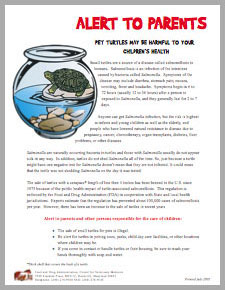|
| |||||||||||||||||||
| ||||||||||||||||||||||||||||||||||||||||
 |
|
Salmonella |
Glossary Sitemap | ||||||||||||||||||||||||||||||||||||
 Salmonella is a legitimate concern especially when children are involved. A major source of transmission is children placing young RES in their mouths and contracting the bacteria. A 1970's prevention law was enacted to reduce these types of cases by prohibiting the sale of turtles with shells less than 4" long, unless for scientific or educational purposes. That law excluded turtles that were exported and many RES were eventually introduced into foreign ecosystems. This law is still in effect and many RES are still being exported.
Salmonella is a legitimate concern especially when children are involved. A major source of transmission is children placing young RES in their mouths and contracting the bacteria. A 1970's prevention law was enacted to reduce these types of cases by prohibiting the sale of turtles with shells less than 4" long, unless for scientific or educational purposes. That law excluded turtles that were exported and many RES were eventually introduced into foreign ecosystems. This law is still in effect and many RES are still being exported.Turtles can carry salmonella and transmit it, but they do not often get sick from it. Many other reptiles and animals also carry salmonella, so it is best to practice some basic hygiene. Rinsing hands before handling a RES and then washing them after contact with soap can be highly effective. RES may carry salmonella in their intestines and it may be released during times of distress. To check if your turtle has salmonella, you will need a vet to properly test for it. However, a negative result may mean your turtle has not released any at the time of testing. It's always possible for your RES to contract salmonella at a later date. If your RES is tested positive for salmonella, then you might want to quarantine your slider and follow instructions from your vet. You may want to review your turtle's living conditions. Those tests should be run again in a few weeks to check the status of the condition. Remember, salmonella is usually not a danger to the animal and problems are avoidable. Additional articles related to salmonella: Anapsid.org - Herps and Zoonoses (And Related Human Health Concerns) http://www.anapsid.org/mainzoonoses.html Arav.org - Salmonella Bacteria and Reptiles: Client Educational Handout http://www.arav.org/salmonellaowner.htm PetEducation.com - Salmonellosis and Its Risk to Reptile Owners http://www.peteducation.com/article.cfm?cls=17&cat=1797&articleid=623 Related Topics: Important Legal Issues Handling Hands should be clean before handling and washed after handling RES and their environment. This is especially important for children, the sick and for those who handle food or other pets. A liquid soap dispenser is fairly convenient for this purpose. Areas that come into contact with your RES should be kept clean and sanitized. Keeping your turtle environment and feeding material in the best possible condition goes a long way in the minimization of bacteria and salmonella contamination. Comment: Any pet should be absolutely restricted from a kitchen or any food preparation area. Avoid using the kitchen sink when cleaning your RES and its items. I would also refrain from using a bathtub or bathroom sink. If you do utilize these areas, make certain they are properly disinfected and sanitized after use.Anyone who might handle your turtle should be notified of the proper ways to do so. Improper handling can cause distress, which may cause the turtle to release salmonella. It is not recommended for children to handle or take care of turtles. Turtles are not necessarily a “hold and pet” kind of animal and it is important that children understand that. They should always be supervised when around the turtle and they can be taught a great lesson in responsibility. |
|
![]()
Click here to comment about the site.
This page updated: 2011/01/28 Copyright © 2005-2011 Red Ear Slider. All rights reserved.